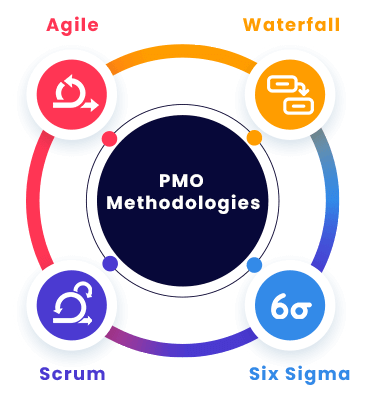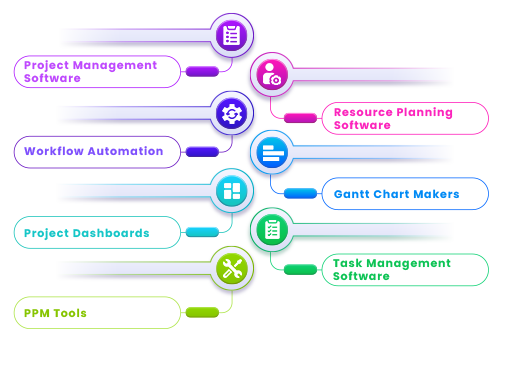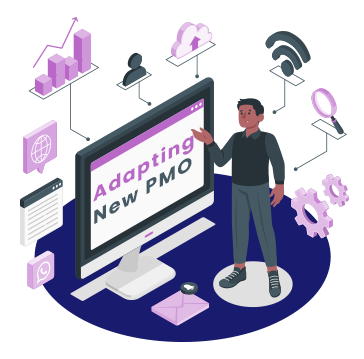Project Management Office
Achieve high power efficiency with smooth task management and deliver top quality products that ensure client satisfaction.
What is a PMO?
A service or department that outlines and upholds the standards of project management for your company, is called a Project Management Office (PMO). It hosts all your documentation and data for carrying out projects. It supports task management and can deliver your project within your budget, on time. PMO helps you implement a project in an efficient way. Your company benefits from PMO through standardization of procedures, project management processes and approaches. PMO can be internal and external, and can be customized to your organization’s work culture and strategies. PMO’s are becoming increasingly popular as 7 out of 10 companies worldwide are adopting it. It’s time for your organization to make the change too! A PMO could play various roles in your organization:
Why PMO at iBeris?
We Improve Your Performance
Our PMO services offer you a practical project control framework to improve your performance with a consistent approach.

Tailor Made Teams
We provide suitable project managers, business analysts & product management teams to enhance your profits & bring value to your company.
We Understand You
At iBeris, we understand your business requirements and provide you with a complete set of PMO tools for succesful project management.
Expertise
At iBeris, we have certified project management professionals with experience in handling projects from a vast variety of industries.
PMO Methodologies
- Agile: The agile methodology is the most popular, where it is applied to projects that rely on speed and flexibility to continuously deliver products in short delivery cycles. It is an iterative approach to preparation and planning projects that breaks the steps into smaller cycles called sprints.
- Waterfall: Is a linear methodology in which clear and defined set of steps are predetermined. Each step depends on the results from the previous step. It provides increased control during each step however, it can be inflexible and does not include the client in the project development process.
- Scrum: Is a part of the agile framework and consists of several sprints. Deliverables are available at the end of each sprint. A sprint usually varies between 15 and 30 days. Teams that find prioritizing work find Scrum to be advantageous.
- Six Sigma: Is a methodology used to improve quality by getting rid of defects of a product or service that does not conform to its specifications. It utilizes statistical analysis rather than guesswork to improve business processes.


Benefits of a PMO
- Standardized methods and procedures for your projects.
- Clarity and consistency through a centralized approach to project management.
- Decreased project costs for your organization due to accurate time, cost and resource estimates.
- Decrease the likelihood of revisions, saving crucial time.
- Flag any similarities among projects, share data and resources across teams.
- With PMO, staff are better trained, which ensures project success and employee retention.
Common PMO Tools
- Project Management Software.
- Resource Planning Software.
- Workflow Automation.
- Gantt Chart Makers.
- Project Dashboards.
- Task Management Software.
- PPM Tools.


Adapting to a new PMO
- New methodology.
- New guidelines and operating procedures for the projects.
- New knowledge base.
- New repository for project managers.
- Alignment with benefits and strategy.
- New software.

FAQ: PMO
What is an effective PMO?
An effective PMO is one that has experienced professionals, working with the right attitude and growth mindset. The PMO has to be customized to the needs of the project and the organization, and also update itself constantly.
Who should PMO report to?
PMOs function according to the organization's requirements and aims, so each PMO is organized differently. Nearly half of PMOs report directly to C-level executives, while some PMOs report to a vice president or higher level executives.
What are High level PMO functions ?
Planning (milestones), Financial planning (budget), RAID (Risks, Assumptions, Issues, Dependencies) Management, Reporting and Reporting Type, Quality assurance, Change control (scope, costs, schedule, benefits), Resourcing (orgdesign, recruitment, resource planning), Communication, Procurement Project document storage
What is PMO role structure?
A PMO structure is a group or department that defines and maintains project management standards within an organization.






